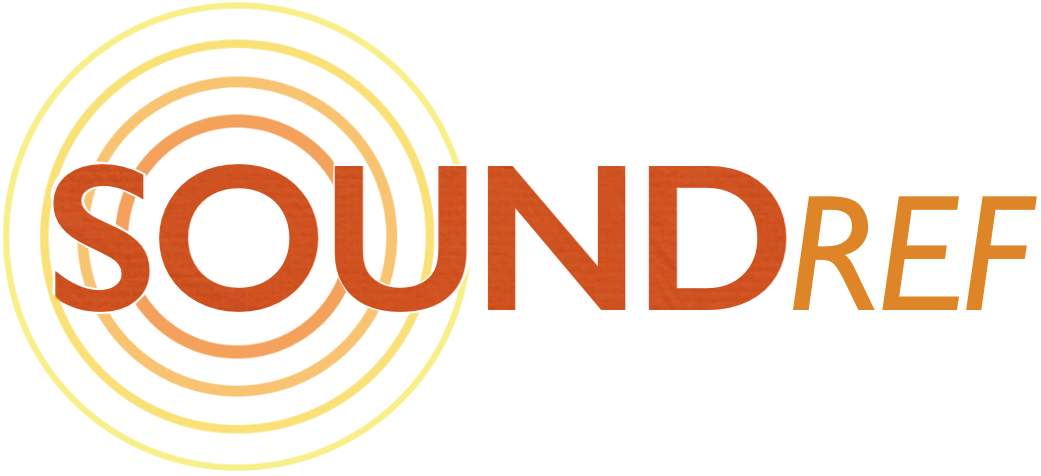The World’s Best Online Music Production Courses
A personal pick of the top online courses for taking your music to the next level
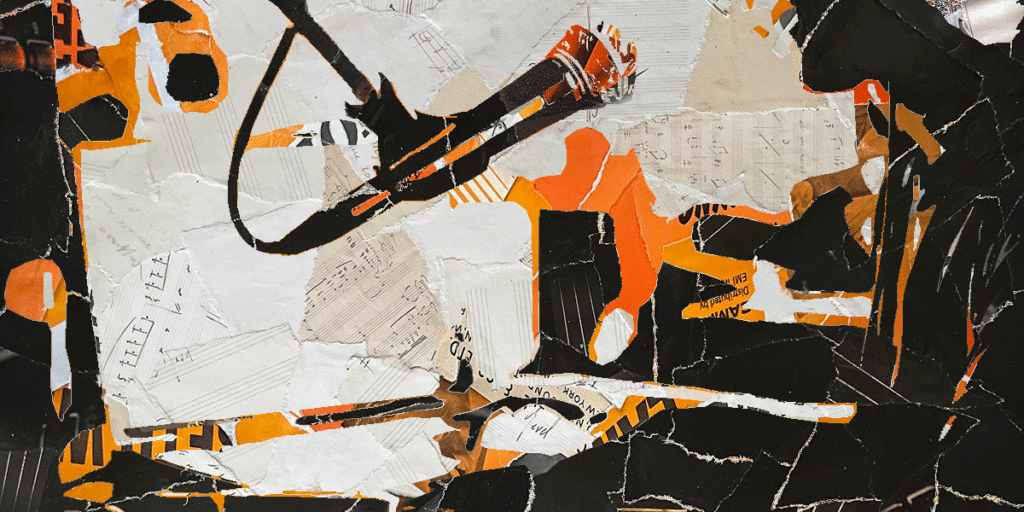
Author: Daren Banarsë
Last updated: October 2023
With so many online courses out there, how do you find the best music production courses? I’ve had a deep dive into all of the online learning options, and discovered an inspiring array of exciting opportunities for anyone looking to further their music production journey…
Why I’ve made this guide
I’m Daren, a former lecturer in composition and music production on the degree course at Goldsmiths College (University of London). I’m lucky enough to have had my music featured on several high profile BBC TV productions including The Apprentice, Top Gear, and Newsnight.
I know what it’s like when you’re on the journey towards getting your music out there.
My first computer and keyboard setup sat in the corner of my studio flat, unused for a full year!
I knew it held the key to a life of producing and composing, but whenever I booted up, I was overwhelmed with a complex interface I just couldn’t make sense of.
I’m a musician, not a scientist!
Things started moving for me when I booked a spot at a local evening college – there weren’t any options to learn music production online back then. Getting signed up to a music production course taught me 3 valuable lessons:
- Doing a course renews your drive and confidence in what you’re doing
- Knowing how to use your equipment is imperative to achieving an engaging and professional sound
- Music production skills and efficiency boosts your creative flow and musicality
Getting started
Getting into music production has never been easier. You can start with the computer you already have with some headphones. Or if you’re ready to make release quality recordings, you’ll need the following:
I have an article with much more detail of what you need to set up a great sounding home studio (including microphone choice and soundproofing) here:
How to Set up a home recording studio
Learning a real instrument
I’ve included two courses which you might not expect in an article about online music production courses – Piano For All and Guitar tricks.
Let me tell you why…
Adding a live instrument to your tracks can give you an advantage over 95% of other aspiring music producers who are purely electronics based. Including something that isn’t programmed, can add more depth and bring your music to life. You don’t need to be a pro – just the basics will go a long way.
It also gives you the option of moving away from the digital studio environment, to improvise in the lounge or somewhere completely different. While playing an instrument, you’ll be able to work on your music on a physical level, and generate new ideas and hooks quite effortlessly.
How I’ve picked the courses
I’ve picked courses which cover a range of abilities, but many of them are suitable for anyone who needs to start from the very beginning. I’ve consulted with other professionals in the industry, as well as music students who are currently studying music production.
I’ve also considered value for money while making the list, especially when considering the cost and time commitment involved. And I have a section for each course where I share my personal thoughts.
The World’s Best Online Music Production Courses
1. Udemy

“Hugely impressed by the shear variety of courses on offer“

The pros
- Massive range of courses on every topic
- Courses can be bought individually
- Learn at your own pace with video courses
The cons
- It takes some digging to find the right course
- Courses vary in price – some are quite expensive
| Length of courses | – From a few hours to over 17 hours |
| Cost | – Courses start at around $14.99 for ‘new users’ – More expensive courses around $100-200 – Spot sales with big discounts – Personal Plan subscription has 8000+ courses for $16/month |
| Free trial | – None for individual courses – 7 day free trial for the personal plan |
Who are Udemy?
Founded in 2010, Udemy is an online learning and teaching platform, overing a wide range of subjects. Udemy has grown over the last decade to now offer over 210,000 courses taught by more than 70,000 instructors.
Udemy doesn’t make their own courses – they provide a platform for instructors to build their own. Anyone can make a course by uploading their videos, pdfs or audio files, but it has to pass Udemy’s vetting procedure before being published.
The biggest advantage of Udemy is their extremely wide range of subjects. There’s so many instructors with industry experience, that you can shop around, and find an expert in exactly what you’re looking for.
UDEMY – Recommended courses
How does Udemy work?
The first thing you’ll see on the Udemy homepage is the search bar. I’d suggest being being specific here – searching for ‘music’ returns 6,478 results! From your search results, you can further sort by most relevant, most reviewed, highest rated, or newest.
There’s also search filters to refine your results by rating, video duration, price, skill level and topic. You can use these to narrow down your selections, before checking out the user reviews and instructor. You can preview the course to get an idea of the flavour too.
Once you have picked and paid for your course, you’ll have to log into your Udemy account for access. All of the courses have instructional videos and lectures, but many of them also include supporting written resources too.
What I think of Udemy
Udemy’s real strength is the shear variety of topics – I’ve used it for music courses, and a whole lot more. I find the layout intuitive, and the per-course-pricing is simple and straightforward.
The video format is will suited to learning music and music production – it’s a bit like watching YouTube, without having to search through tons of dud videos. The filters make it easy to find courses with good reviews, and the support from the online discussion boards is really helpful.
Don’t be put off by the expensive price tag on some of the courses, Udemy have offered soundref.com readers . I’ve listed the four courses I recommend for music production in the boxes above. Here’s some more detail on my two favourite ones…
Recommended Udemy Course: Music + Audio Production in Logic Pro X – The Complete Course
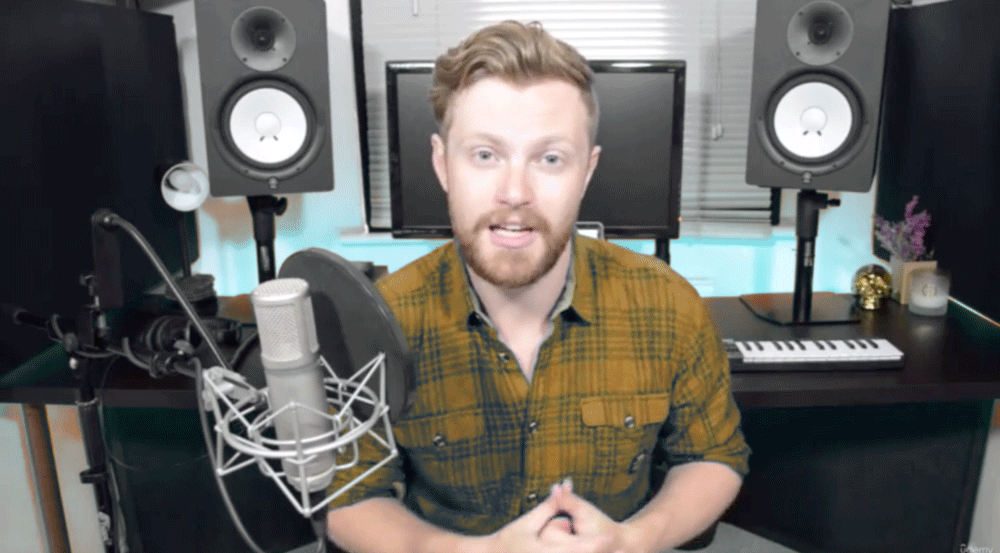
One of the most popular pieces of DAW (Digital Audio Workstation) software on the market is Logic Pro.
Logic Pro was made specifically for the Apple OS, and has been on the market since the early 2000s. Over the years, Logic Pro has become the first choice for amateurs and professionals who use Macs.
Like any DAW, Logic Pro can be tricky to get your head around – I still remember trying to figure it all out when I was starting out. I’ve been writing for film and TV for 20 years now, and there were parts of this course which really helped me speed up my workflow.
I believe this online music production course will give you a solid and comprehensive introduction to Logic Pro. You’ll learn how to record, edit and to mix using Logic’s plugins, which are really high quality.
- Price: $139.99
- Contents: 40 hours of on-demand video, 15 articles, 2 downloadable resources
Recommended Udemy Course: Complete Mixing Masterclass
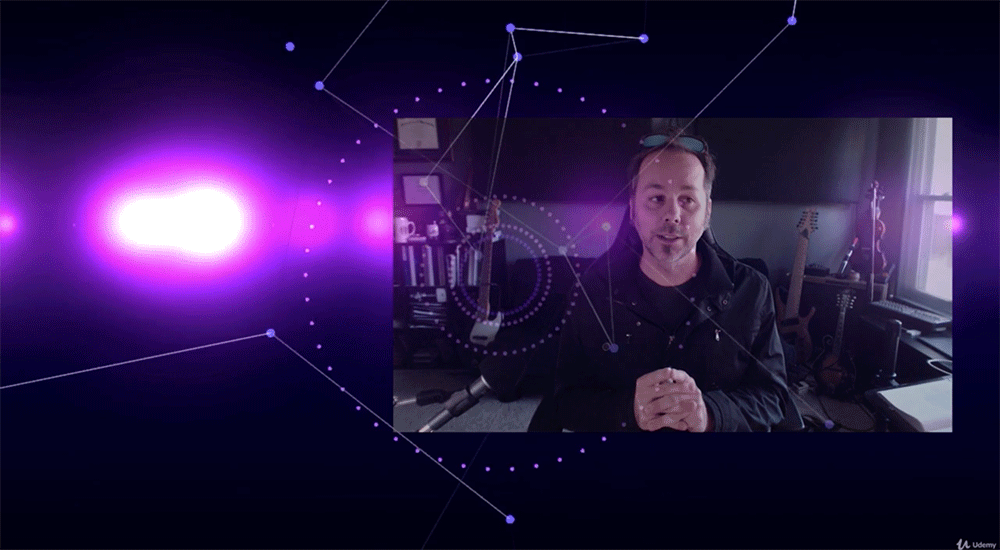
A lot of online music production courses focus on technical, creative or compositional side of music production.
But this Udemy online music production course is focused on one area which is often neglected – mixing. Audio mixing involves a lot of elements – placing the instruments on the sound stage, making each voice clear and audible, and creating and automating various effects.
It will take some time to master the multiple skills needed for mixing. That’s why the course offers 7+ hours of video plus a selection of downloadable resources and articles. There’s a breadth of topics too covering compression, EQ, Panning and FX and more. You’ll also learn how to set up a mixing environment, fix out of tune instruments, sound engineer and master your tracks.
The course is run by Jason Allen, a university music professor and one of the top-rated Udemy instructors for music. Many of his courses are best sellers and from looking at this course I can see why.
- Price: $79.99
- Content: 7.5 hours of video, 6 articles and 2 downloadable resources
2. Coursera

“Real university courses from around the world”
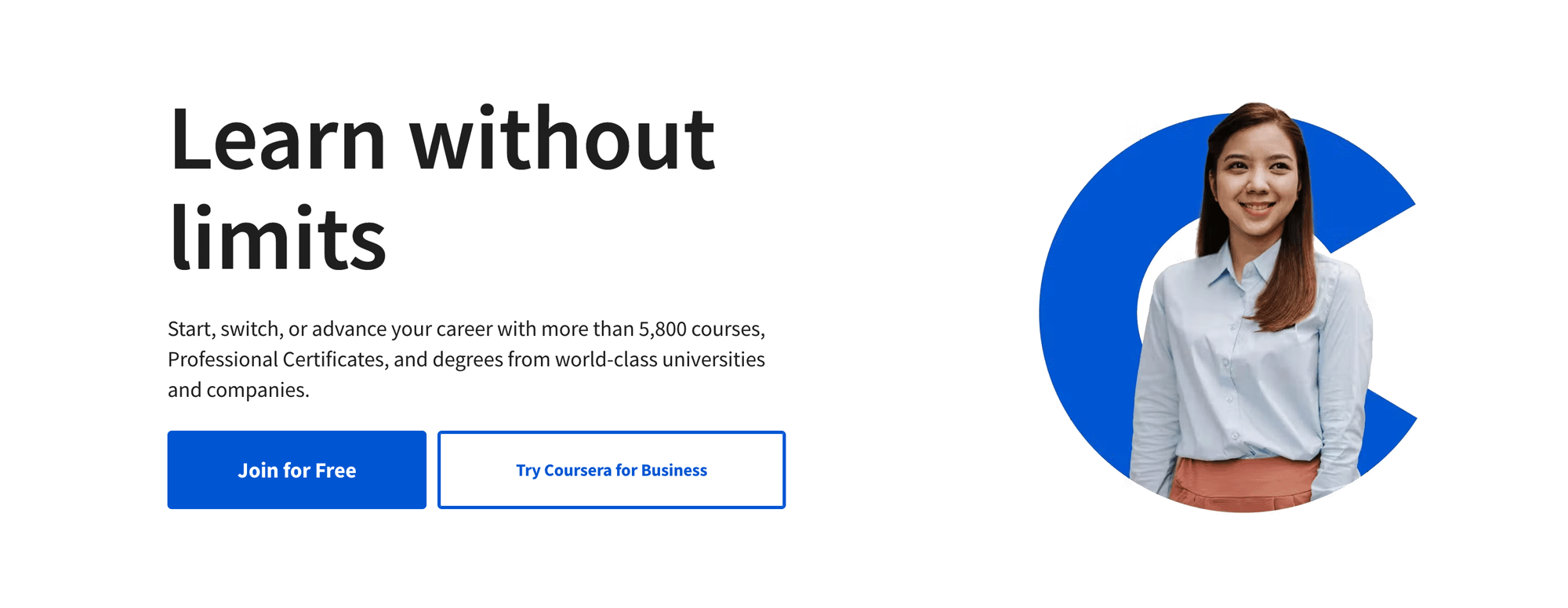
The pros
- Courses from leading universities and educational institutions
- Some courses offer qualifications
- Some courses are free
The cons
- Website and pricing can be confusing
- Limited feedback from tutors
- The ‘peer review’ system has its limitations
| Length of courses | – Guided projects and short courses are usually between 1 and 12 hours – A full degree can last 2-4 years |
| Cost | – Costs vary a lot depending on the course type – Many shorter courses are offered for free or under $100 – Pricing for a full degree begins at $9,000 |
| Free trial | – 7 day full access free trial – Enrol for free on many courses for 7 days |
Who are Coursera?
Coursera was founded in 2012 by two Stanford University computer science professors. It has a unique approach, partnering with universities and other educational institutions to offer a range of courses and certificates. And in some cases it’s even possible to earn a real degree through Coursera, following the same curriculum as the university course.
Currently, Coursera works with more than 275 universities and companies, offering over 4,000 courses. They seem mainly geared towards business and STEM qualifications, but I’ve discovered some excellent music production courses too.
COURSERA – Recommended courses
How does Coursera work?
On the Coursera homepage, you’ll find the search bar, which is your first port of call. Searching for ‘music’ returned 435 results, which you then filter by course, subject area, language and skill level.
Once you’ve found your course, there’s more information on skill level, cost, time commitment, and a breakdown of the course structure. By going into the modules, you can see some previews.
From there you have the options to either buy it, or sign up for a Coursera subscription. To access your course, you’ll have to log in to your Coursera account. Here you’ll find all the materials – video, audio, and any supporting documents.
What I think of Coursera
Coursera has a unique position amongst the course providers in this list – access to some really high-quality courses from the most prestigious music schools and universities in the world. And that includes courses from Goldsmiths College and the University of London, where I used to teach undergraduates how to write for film, TV and adverts.
What I love about Coursera, is how you can save the time, travel, and even lodgings costs traditionally associated with going to uni. There’s no strict timetable and you can follow the courses in your own time, at the place of your choice. This style of learning will suit the artistic temperament more more than sitting in an early morning class, taking notes!
There’s no full music production degree, but there are in-depth certificate courses from Berklee College (America’s top music school), which are well worth taking – more details below.
Recommended Coursera Course: Electronic Music Production Specialization
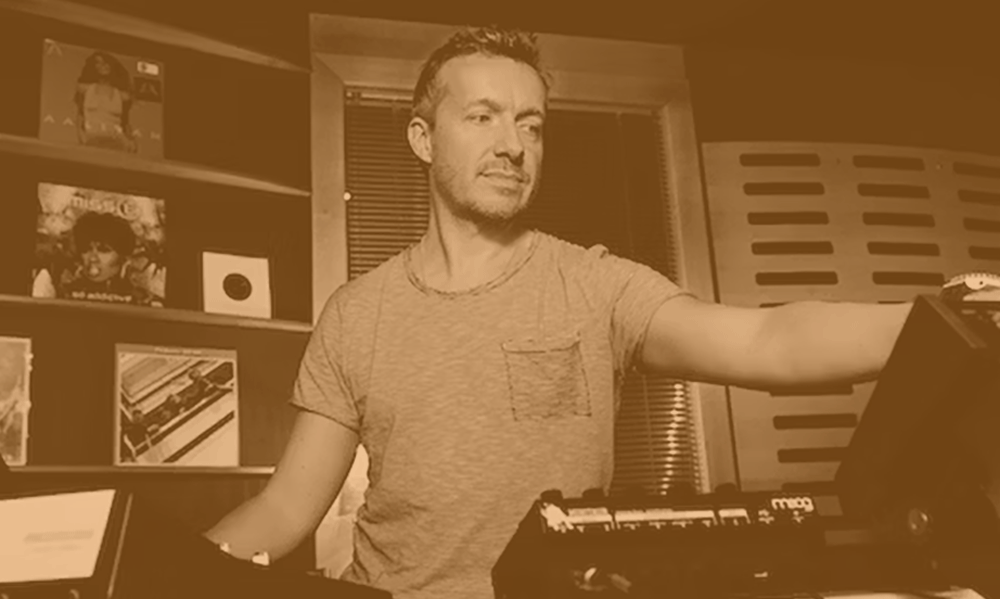
Aimed at the aspiring electronic music producer, this course is run by the prestigious Berklee College of Music in the US.
The audio production course has a focus on Ableton Live, and is divided into four parts:
- The Technology of Music Production
- This is like a theoretical foundation – you’ll learn the fundamentals of audio production, and how sound works and travels. You’ll see how to set up your DAW, start recording and editing audio, and use dynamic, delay and filter effects to enhance your sound.
- Introduction to Ableton Live
- Learn how to use the industry standard software for electronic music to create loops and record and edit audio. You’ll make your own music with audio and programmed MIDI drums and instruments.
- Creating Sounds for Electronic Music
- Making your own synthesiser patches is crucial to creating your unique sound for electronic music. Stick with this module, and you’ll learn how to program synthesisers, and get started with sound design.
- Electronic Music Performance Techniques
- This is a short beginners’ intro to performing and arranging your electronic music on an EDI (electronic digital instrument). You’ll make drum beats and bass lines, and learn how to live loop while soloing on top.
- Cost: Free for 7 days with free trial, then $49 a month
- Length: 1 months at 10 hours a week
Recommended Coursera Course: Music Production Specialization
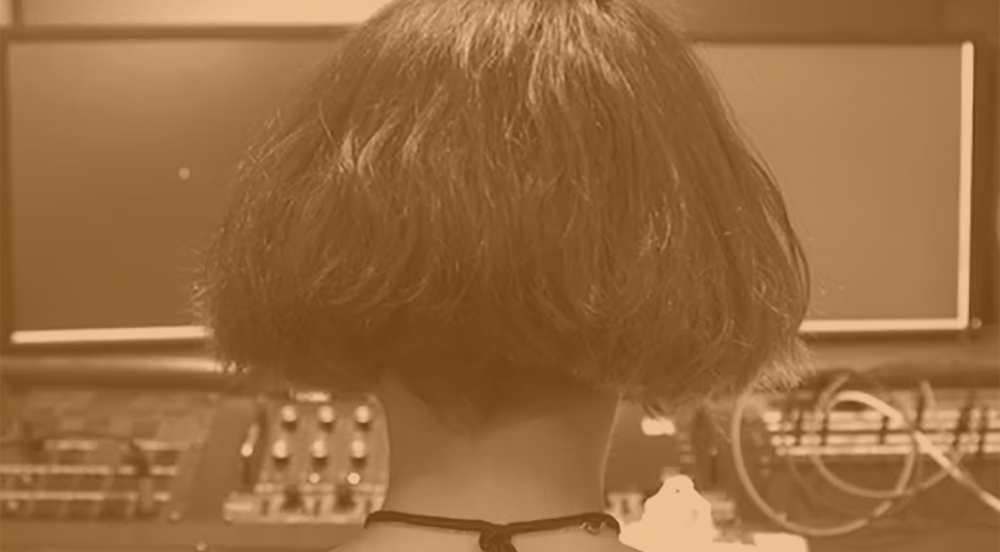
An alternative to the Electronic Music Specialization is, the broader Music Production Specialization.
This online music production course is also run by Berklee, but instead of the focus on electronic music, and centrrs on recording and producing a wider variety of genres. There’s four sections:
- The Art Of Music Production
- This is all about establishing your signature sound by listening to reference tracks, and identifying key elements. Once you’ve established your artistic vision, you’ll make your own music by using specific audio production techniques and tools.
- The Technology Of Music Production
- This is the theoretical foundation of sound science, how it travels and setting up your DAW. You’ll learn how to record and edit audio, and use dynamic, delay and filter effects to give your production that professional polished sound.
- Pro Tools Basics
- Pro Tools is the industry standard for music production, and you’ll have a chance to familiarise yourself with the Pro Tools interface. You’ll look at both synthesisers and samplers, and learn how to use them. After recording a live performance into Pro Tools, you’ll encounter mixing techniques – balancing volume levels, panning and adding effects. This module is a real gem, with a lot of info delivered by an engaging instructor.
- Music Production Capstone
- In this module you get to produce a track all the way through to the final mix and mastering. You’ll learn how to use the ’emotional and dynamic timeline’ to make a mock up of your track and make edits. And you’ll use all the tools you’ve learnt in the previous modules, such as EQ, volume levels and panning to match your reference tracks. There’s also advice for sound engineers – ensuring the performers a comfortable, and running an efficient session.
- Cost: Free for 7 days with free trial, then $49 a month
- Length: 1 months at 10 hours a week
3. Masterclass

“Learn from the best and most well-known instructors”
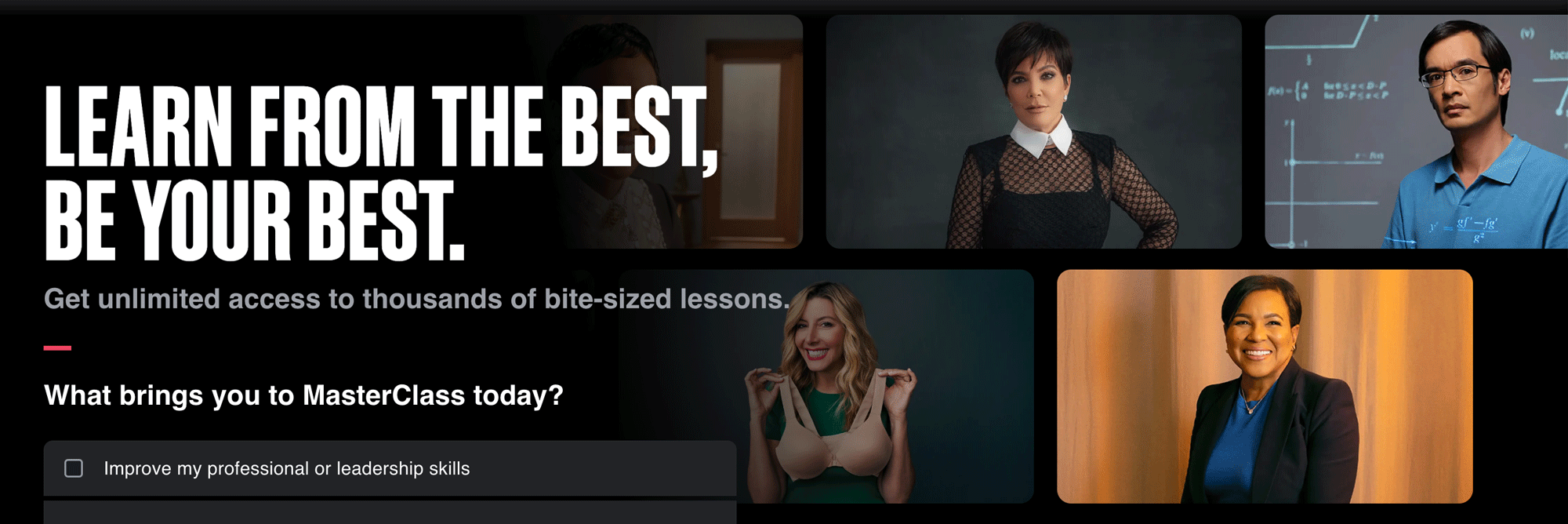
The pros
- Well-known experts and leaders in the field
- Fantastic production values
- Fascinating insights and insider tips
The cons
- Some courses lack depth needed for advanced students
- Courses are quite short at 2-4 hours
- No monthly subscription
| Length of courses | – Around 2 to 5 1/2 hours of video content |
| Cost | – Subscription with different tiers: – $120 per year for 1 device – $180 per year for 2 devices (offline access) – $240 for a family subscription – 6 devices (offline access) |
| Free trial | – No free trial, but full refund within 30 days – Each course has a trailer and preview video |
Who are Masterclass?
Have you ever wanted to be taught how to make beats with Timbaland? Or how to compose by Hans Zimmer? Or how to produce music by deadmau5? The Masterclass instructors are often successful leaders in their field, most of them world famous.
The ‘Netflix’ of online courses, the videos are beautifully shot with the highest production values. They’re as entertaining as the are informative, and always a pleasure to watch. Masterclass covers quite a ide range of topics as well as music.
There’s 24 music production courses at the time of writing, including singing, songwriting, music production, guitar, drums, violin and DJing. Instructors include Danny Elfman, Hanz Zimmer, St Vincent, Timberland, Christina Aguilera, Mariah Carey, Tom Morello, Ringo Starr, Herbie Hancock, Deadmaus, and Alicia Keys.
MASTERCLASS – Recommended courses
How does Masterclass work?
One thing I like about Masterclass is its simplicity. A subscription will get you access to any of the content on the website – simply navigate to the page of the course that interests you and start watching.
There’s also the option of Masterclass ‘Sessions’, where you can take a video course as part of a structured curriculum. You’ll receive step-by-step instructions, and be challenged to explore more of your own creativity. Sessions by Masterclass are for all skill levels, and your work will be reviewed by peers from the global Masterclass community.
You can access the courses online with a browser, or through a Masterclass mobile app. The app will also give you access to just the audio portion of each course, so you can listen on the go.
What I think of Masterclass
Masterclass offers a unique take on online learning – it’s as much entertainment as it is education. One fascinating and inspiring aspect of each course is a glimpse into the creative process of leading artists and musicians.
Although the production value is always high, I found the standard of the courses varying significantly between each instructor. Some courses have more advanced content which may not suit beginners. But others can feel a little skin-deep, falling more into the category of ‘industry-insider tips and tricks’ than a practical tutorial.
If like me, you have broad interests in music and audio production (and other subjects), and you want to know how the industry experts work, a Masterclass subscription would be a good choice. It really does make learning as easy and entertaining as watching TV. But if there’s just one or two courses you’re interested in, and you won’t be using of all the content, a yearly subscription would probably not offer the best value for you.
Recommended Masterclass Course: Producing and Beatmaking with Timberland
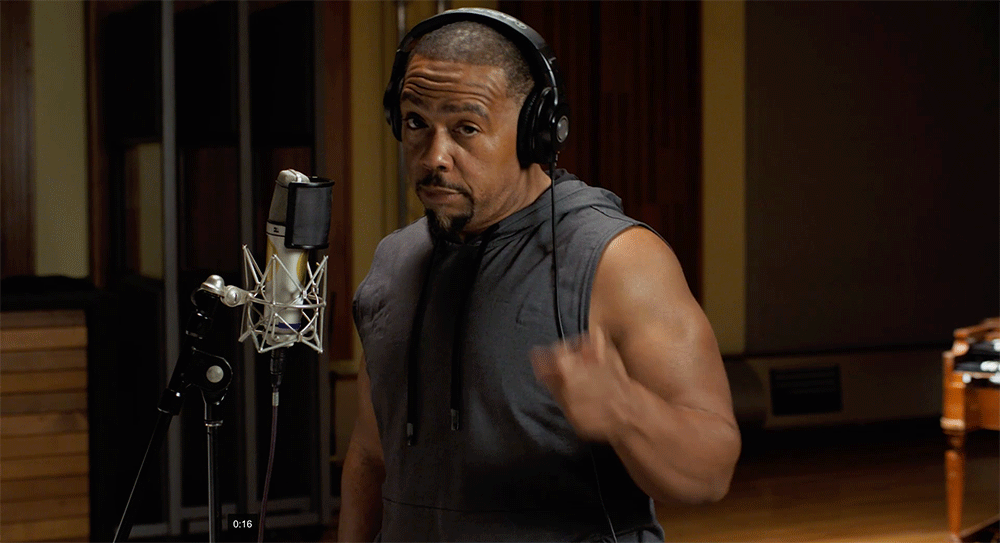
If you’re interested in music production, pop music or hip-hop, then this course offers some great instruction from one of the giants of the industry.
Timbaland revolutionised the way people think about and produce beats. He produced many hits with acts such as Justin Timberlake, Jay-Z, Madonna, Rihanna, Beyonce, Drake and Bjork.
In this fourteen part online course you’ll get an insight into Timbaland’s process, from beat-boxing a sketch of a simple idea all the way to the final mix. You’ll learn looping, mixing, layering, adding vocals, and how to collaborate with other artists. There’s also breakdowns of specific tracks and the stories behind them.
This online music production course is a must-see for any Timbaland fans, as well as anyone else needing guidance on how to get creative with their beats. One aspect of the course I really respect is Timbaland’s message of how crucial it is to work hard, stay dedicated, and never give up. It’s good advice – crucial if your ambition is to become an established artist or music producer.
Recommended Masterclass Course: deadmau5 Teaches Electronic Music Production
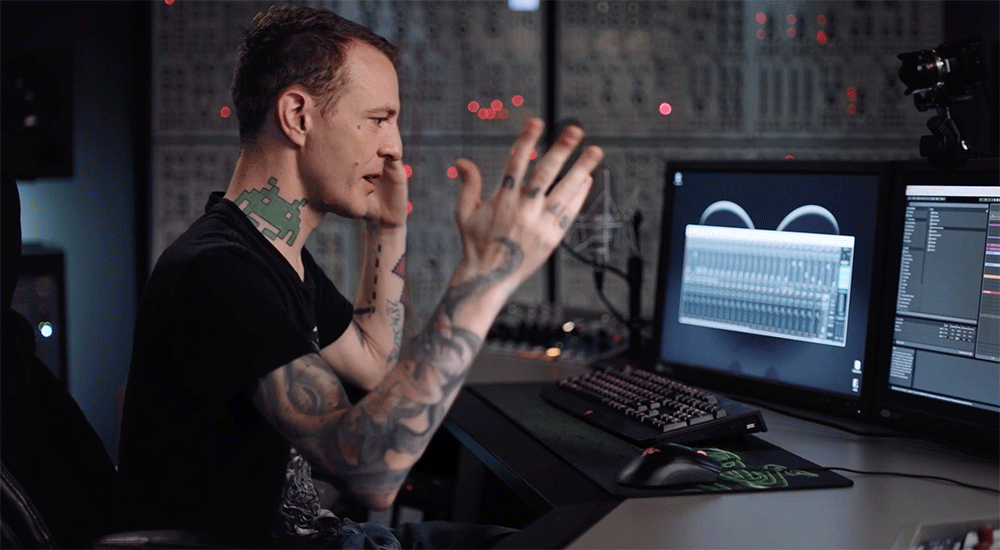
‘Deadmau5 Teaches Electronic Music Production’ is a stunning Masterclass course for electronic music producers.
In this inspiring online course, EDM’s favourite giant mouse doffs his helmet to give us a clear insight into his producing process. Deadmau5, aka Joel Zimmerman has had an incredible career as one of the most successful electronic dance musicians and progressive house DJs in the world, and this is a rare window into his creative world.
Throughout the course you can watch Joel make electronic music tracks in real time. You’ll learn about writing melodies and beats, and how to turn them into arrangements. You’ll also experiment with synthesisers – including modular synths, and learn the difference between digital and analogue synthesis.
And it doesn’t stop there. There’s guidance on structuring a track, mixing, remixing and mastering. Although he’s surrounded by thousands of dollars worth of rack mount synths, he’s also very down to earth, with plenty of advice about what you can achieve with a laptop and a few VSTs.
Joel is very generous with his time, providing 23 videos which clock in at almost 5 and a half hours. With 3 videos focusing on live performance, and sections on the music business and working as a producer, this is a great all round online music production course for anyone serious about a career in producing.
4. Skillshare

“Terrific value subscription for a huge range of courses”
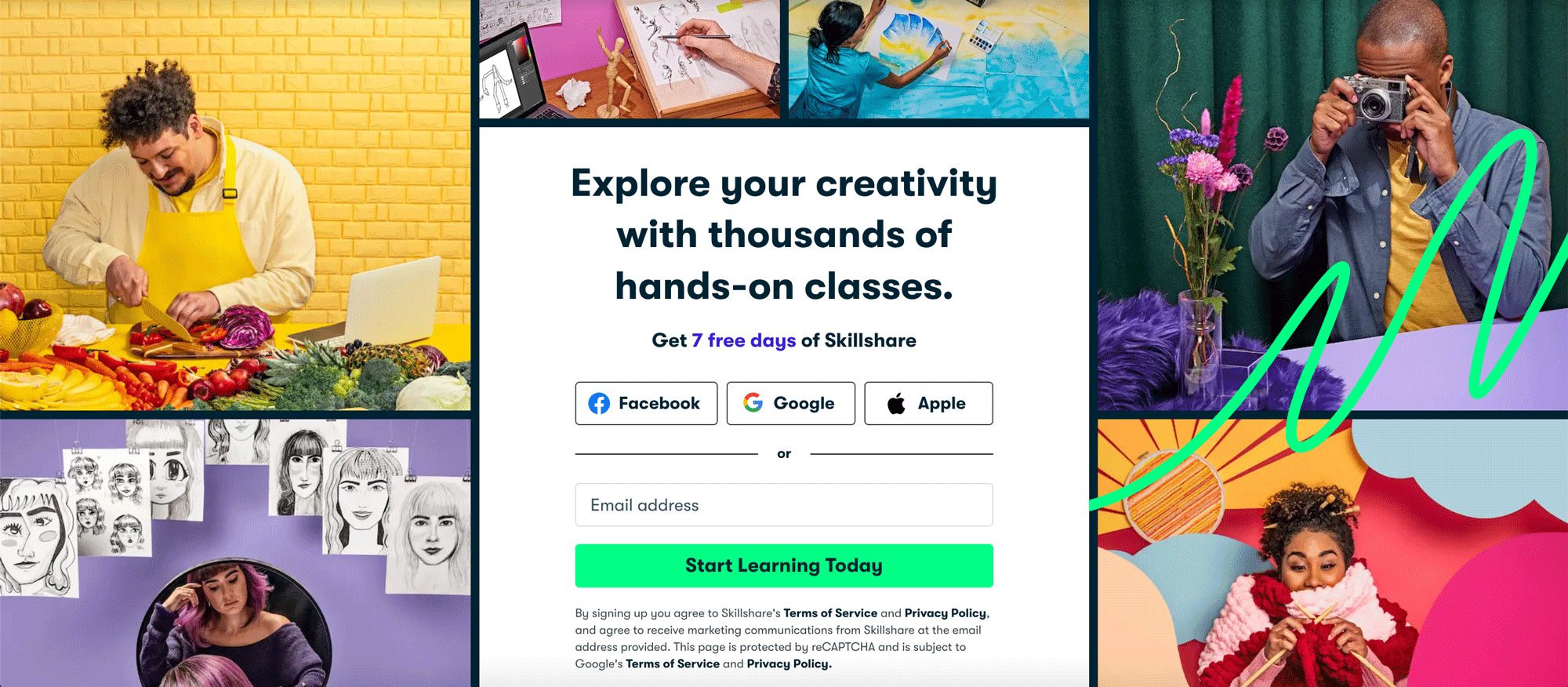
The pros
- Thousands of courses on every subject
- Focus on creative subjects
- Affordable
The cons
- Courses vary in quality
- Annual Billing
- No feedback from instructors or accreditation
| Length of courses | Courses last anywhere between 10 minutes and 15 hours |
| Cost | – $168 billed annually ($14 per month) |
| Free trial | – 7 day free trial |
Who are Skillshare?
Active since 2011, Skillshare is an online learning platform with courses on nearly every subject. It follows a business model similar to Udemy, with video based courses created and submitted by individual creators.
Where Skillshare differs from Udemy is its focus on creative subjects. The majority are in animation, creative writing, fine art, graphic design, illustration, photography, UX/UI design and music. But you’ll also find courses on freelance skills, marketing, lifestyle and productivity – all important areas for musicians and producers.
The Skillshare catalogue is vast, with thousands of videos available on music alone. As the courses are user-submitted, they can certainly vary in quality, but Skillshare does vet submissions to make sure they meet their standards. They also have a series – Skillshare Originals, with a large selection of quality in-house courses made by experienced instructors. But many of the user submitted courses are also high quality and very popular.
SKILLSHARE – Recommended courses
How does Skillshare work?
On the Skillshare homepage, click on the music tab, and you’re presented with a number of sub-categories, such as: music composition, music education, music fundamentals, music production, music theory, sound design, piano, Ableton Live, guitar, and songwriting.
To explore further, it’s not the most intuitive process – you get the choice of viewing all of the ‘popular music classes’ or all of the ‘trending music classes’. Either way you can filter your results by course length, from under 15 minutes, to over 60 minutes. It’s probably just better to use the search bar at the top of the page, where you can get more specific with the terms you’re looking for.
Once you do find a course, there’s a class rating and some reviews you can look at to help you decide whether its the course for you.
A subscription to Skillshare gives you access to all of their content on the website – around 30,000 courses. There’s also a mobile app to download if you need to view downloaded content offline. As well as the the video content, many of the Skillshare courses have supporting resources such as worksheets and PDFs. There’s also a handy user forum where you can connect with other learners to share ideas and support each other.
What I think of Skillshare
There’s a huge amount of quality content on Skillshare for musicians, and you’ll surely find something to match your niche interest. One problem I had with the interface was trying to pick a suitable course where there’s so much choice. I’d appreciate a way to filter courses by the class ratings, rather than only see ratings once I’m on the course homepage.
The community forums are a great touch, but do note that there’s no tutor feedback here. The annual subscription model means you’ll be able to dive right into the deep end from the start. There’s so much content available that I consider Skillshare to offer very good value for money.
For soundref.com users, they’re also offering a 30% discount with the code soundref30.
Recommended Skillshare Course: Ableton Live 1: The First Steps of Digital Music Production
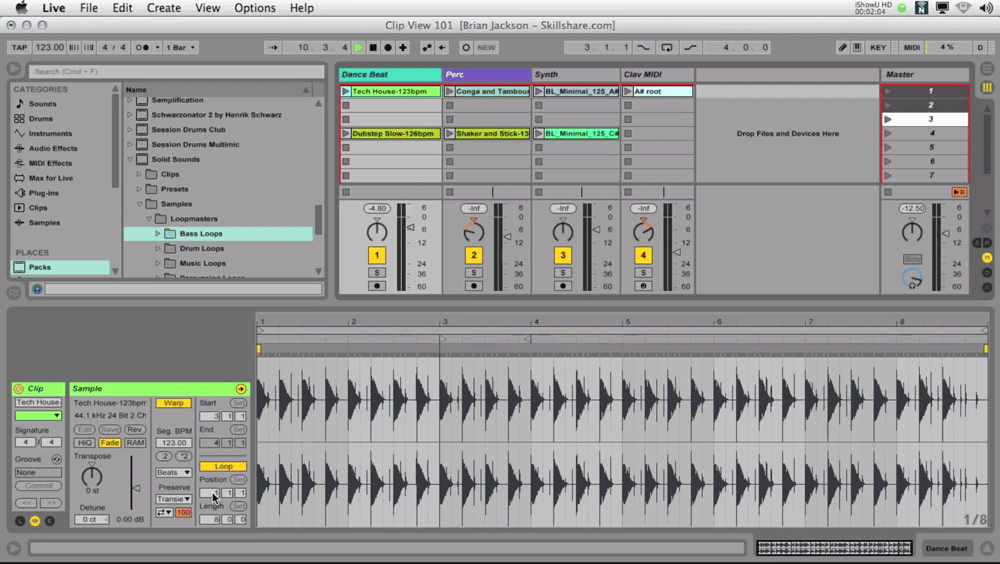
At just 65 minutes, this is among the shorter courses I’ve reviewed. It’s actually a length that feels just right for the course.
Ableton Live 1: The First Steps, is an online course aimed at complete beginners, suitable for those with no experience at all. It’s a crucial course to take if you have the software ready, but have no idea how to use it.
You’ll become familiar with the Ableton Live interface, and learn the difference between scenes, tracks and audio clips. There’s also a lovely introduction in how to match the tempos of different tracks, so they all play along at the same speed.
Once you’ve finished the course, you can go on to complete the next courses in the series, all by Brian Jackson, author of ‘The Music Producer’s Survival Guide’
- Ableton Live II: MIDI (Musical Instrument Digital Interface)
- Ableton Live III: Shape Your Own Audio & Beats
- Ableton Live IV: Finishing a Track
Recommended Skillshare Course: Music Fundamentals: Explore & Create Your Unique Sound

A highlight of the ‘Skillshare Originals’ range is Jacob Collier’s online course in discovering your signature sound.
Jacob Collier is a well-known jazz singer-songwriter who gathered his audience, and the respect of industry pros by making extremely creative YouTube videos. I actually first heard him when someone forwarded a gorgeous jazz melodica solo in the middle of one of his arrangements.
He’s just as well known as a music educator, and has a virtuosic understanding of harmony and melody. As a Skillshare Original video, it has all the production values of a ‘Masterclass’ video, entertaining as well as informative. This course offers a glimpse into Jacob’s unique way of understanding and thinking about music, and who better to teach you?
This audio production course is aimed at musicians who already have a general understanding of music theory, and are looking to take what they do to the next level. He covers the subjects of musical taste, melody, harmony, rhythm and even lyric writing. The course contains just over an hour of video, as well as a hands-on ‘class project’ with downloadable audio files.
If you’re not yet at the level required to take this course, don’t worry – give yourself time and make a plan. There’s so many courses on Skillshare that you can tailor your educational path from zero knowledge, and gently build your skill level.
5. Point Blank Music School

“Learn in depth with real instructors”

The pros
- A wide range of music production courses
- One-to-one support from instructors & group sessions
- Learn at your own pace
- Discounts on software
The cons
- Only covers Ableton Live and Logic Pro
- Expensive
| Length of courses | – From 3 months to 2 years – Full or part-time |
| Cost | – From $50 – $200 to register (depending on course) – From $190 – $365 monthly (depending on course) |
| Free trial | – Free sample courses on Logic, Ableton & Music Industry. These are cut-down versions of the full courses. |
Who are Point Blank Music School?
Point Blank Music School was established in London in 1994. and has since grown into a global network of schools. It specialises in music production, sound engineering, DJing and the music business. As well as having established sites in London, LA, Ibiza, Mumbai and China, Point Blank also offer a range of online courses.
There’s a great set of online music production classes, as well as courses in DJing and the music business. Audio production topics include Ableton Live, Logic pro, Music Composition, Sound Design, Mixing, Mastering and Composing for Media. Unlike most online learning websites which offer fairly short courses, Point Blank’s courses normally fall between 3 months and 2 years.
Another thing that sets Point Blank apart from the competition is real contact time with an expert tutor. This is both one-to-one zoom sessions and group masterclasses. You can also get a certificate or diploma on many of the courses once you’ve completed them.
Point Blank Music School – Recommended courses
How does Point Blank Music School work?
Once you’ve chosen a course, the next step is picking an enrolment date. Because Point Blank courses have real tutors, they need to run from specific dates, much like any college or university. There’s also an option to complete some of the courses as a part-time student.
Point Blank online courses are a series of structured lessons, using video tutorials, audio files and downloadable project files. If you’re not ready to commit to the full course immediately, you can take a free mini-course available in either Logic or Ableton, which will give you a good flavour of the teaching style.
The courses involve doing some homework and you’ll be given specific projects to complete. They can be adapted to whatever style or genre you’re interested in. As well as the regular group masterclass sessions, all students have a weekly zoom tutorial with their tutor, for specific advice and feedback on their project.
What I think of Point Blank Music School
Overall, whilst Point Blank is more expensive than other options, it also feels much more like a real university or college course. This is because of the extra student support and one-to-one contact with great tutors from the music industry.
You only have the option of Ableton Live or Logic Pro, but narrowing the choice down allows them to really focus the courses to the relevant production software. You’ll have support, and 1-2-1 contact and feedback from your tutor, which in my opinion is invaluable.
This is the course for someone who wants a clear path to learning their subject thoroughly. Yes, there’s many free YouTube tutorials available, but there’s nothing like learning accurate, relevant information from industry professionals. Get your audio production foundations right, and you’ll have a great base for the future.
Recommended Point Blank Course: Music Production Certificate or Diploma
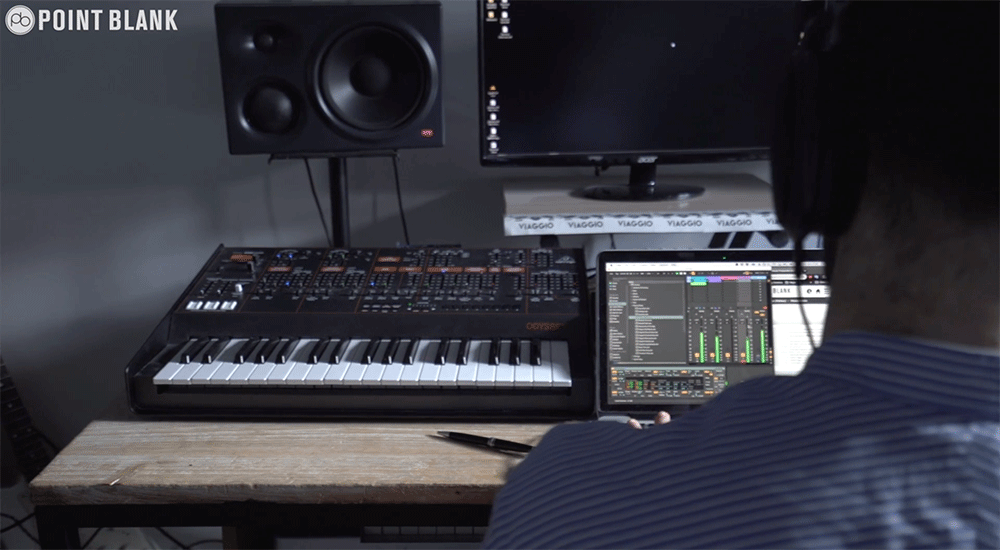
The Music Production Certificate offers a great overview of the essential skills and techniques you’ll need for music and audio production.
The Point Blank Music School Music Production Certificate is taught by expert tutors, some having worked with the likes of Beyonce, Iggy Azalea and others. The course can be studied full time over 6 months, or 12 months part time, and you can tailor the modules of the course to focus on either Ableton Live or Logic Pro.
This online music production course consists of four modules:
- Music Production
- Learn how to record and edit MIDI and audio, how to create arrangements with programmed drums, and how to use and automate audio effects. You’ll create your own audio production project to put with you’ve learnt into effect.
- Music Composition
- Learning how to compose can sometimes be overlooked in the rush to acquire all the right equipment. Some people are self taught in composition, but actually studying the theory of harmony and melody, rhythm and structure, will make life much easier for you and give you a competitive edge.
- Creative Audio
- Now it’s time to use the skills you’ve learnt in producing and composition to develop your own sound. You’ll be encouraged to use your analytical skills to recreate effects you’ve heard in other tracks, and to use your DAW as a creative tool. There’s also a nice section where you’ll be introduced to some of the key figures in recording history.
- Sound Design
- Learn how to build a modular software instrument in order to create good effective sound design for your productions. There’s an introduction to both sound synthesis and sampling which you can use in your compositions.
The Point Blank Music Production Diploma
If you’re serious about your education, an expanded version of the certificate course is available in the Music Production Diploma. This course is good for both beginners and the more experienced. It’s twice the length of the Certificate Course adding four more modules:
- The Art of Mixing
- Creative Production and Remix
- Composing for Media
- Mastering
The Point Blank Music Production Advanced Diploma
In Point Blank’s flagship course, the Advanced Diploma, you’ll get mentoring from A&R Director Kwame Kwaten, and lectures from established hi-level industry professionals. It’s a pro level audio production course designed to prepare you for several areas of the music industry, including sound design, music producing, film & TV composing and remixing. The course adds 4 more modules to the standard diploma above:
- Music industry
- Production styles
- Advanced sound design
- Advanced composition
Discounts on music software with Point Blank
Something to factor into your costs is that whatever course you choose – certificate, diploma or advanced diploma, you’re entitled to apply for a range of substantial educational discounts on a lot of the leading music production software:
- Ableton Live 11 Suite
- Apple Logic Pro
- NI Komplete 14
- Komplete 14 Ultimate
- Ableton Push 2 Controller
- Pioneer DJ equipment
- Eventide Plugins
- Serato DJ
- Waves bundles
- Roland Cloud Ultimate
Point Blank Certificate/Diploma/Advanced Diploma costs (full time):
| Full time | Length | Payment Options | Total |
| Certificate | 6 months | $2,745 payment in full | $2,745 |
| $200 registration and 2 x $1,395 | $2,990 | ||
| $200 registration and 6 x $485 | $3,110 | ||
| Diploma | 1 year | $4,195 payment in full | $4,195 |
| $200 registration and 4 x $1,090 | $4,560 | ||
| $200 registration and 12 x $380 | $4,760 | ||
| Advanced Diploma | 18 months | $5,995 payment in full | $5,995 |
| $200 registration and 6 x $1,045 | $6,470 | ||
| $200 registration and 18 x $365 | $6,770 |
Point Blank Certificate/Diploma/Advanced Diploma costs (part time):
| Part time | Length | Payment Options | Total |
| Certificate | 1 year | $2,745 payment in full | $2,745 |
| $200 registration and 4 x $698 | $2,990 | ||
| $200 registration and 12 x $243 | $3,110 | ||
| Diploma | 2 years | $4,195 payment in full | $4,195 |
| $200 registration and 8 x $545 | $4,560 | ||
| $200 registration and 24 x $190 | $4,760 |
Recommended Point Blank Course: Electronic Music Production In Depth
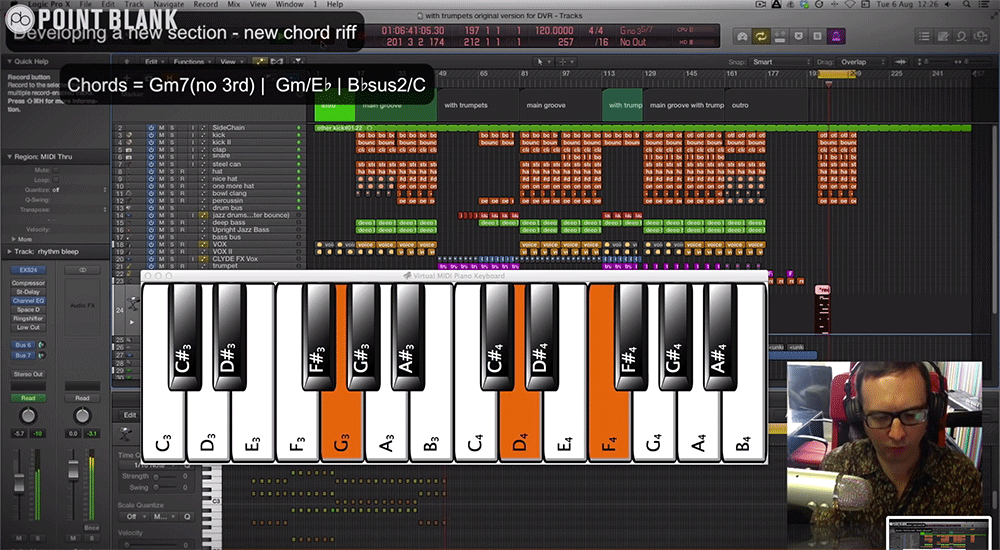
If you’re specifically interested in electronic music, you might benefit from this full time electronic online music production course.
It starts with the same foundational module found in all of the courses above – Music Production (for Ableton or Logic). And in this course, it’s followed by another module called ‘Creative Production and Remix’
You can read about the music production module above – its all about really getting to know your software. And the extra module is an education in developing your own unique sound while working with a top line vocal track. If you’re into dance music, this module will also give you a great introduction into the art of remixing.
Point Blank Electronic Music Production (full time only):
| Length | Payment Options | Total |
| 6 months | $1,595 payment in full | $1,595 |
| $100 registration and 2 x $820 | $1,740 | |
| $100 registration and 6 x $285 | $1,810 |
‘Learn Piano by ear in and intuitive and fun way’
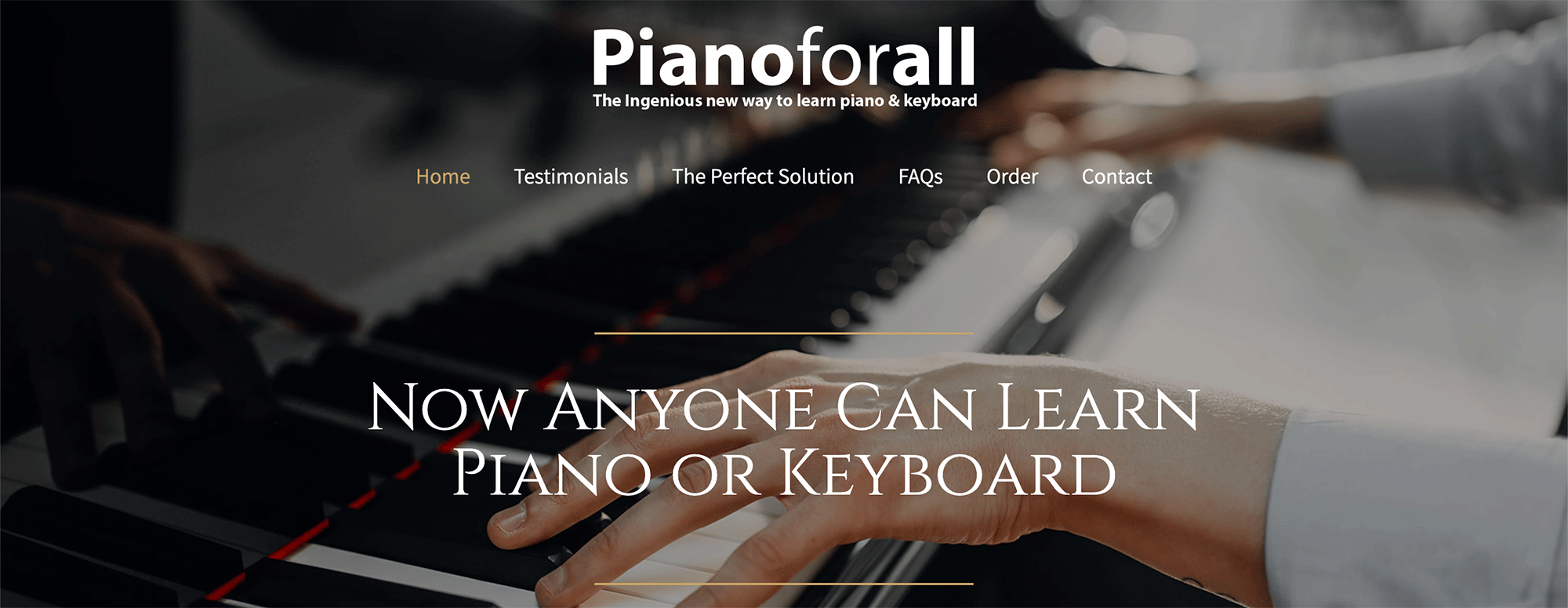
The pros
- Learn to play in many styles
- Learn fast with the ‘by ear’ approach
- Easy to follow
- Single payment
- Learn at your own pace
The cons
- Mostly older styles of music, (less contemporary pop)
- Doesn’t cover reading sheet music in detail
| Length of course | – 9 workbooks of material at different levels – Over 24 hours of video – Recommended time: 20 to 30 minutes each day |
| Cost | – $79 Single payment ($49 with discount) |
| Free trial | – No free trial – 60 day money back guarantee |
Who are Piano For All?
So many people start piano lessons, only to find themselves getting frustrated, struggling to read music and eventually giving up. This is where the online course ‘Piano For All’ aims to make big changes. Instead of dry theory, all the lessons are easy-to-follow and digest.
It’s a course aimed for complete beginners, using an intuitive ‘by eye’ and ‘by ear’ approach to get you playing fun music from the start.
The lessons present a birds-eye view of the piano, complete with a light up chart showing chord shapes and finger patterns. They’re infinitely more fun and satisfying to play than the traditional ‘single note per hand’ style of most beginner piano lessons.
The course starts with what they term ‘rhythm style’ piano – a focus on basic chord and rhythm patterns. It then progresses through a number of different styles, including blues, jazz, ragtime, and ballads. You’ll also learn to improvise and create your own melodies.
Although much of the syllabus leans towards older piano styles, a 2022 update introduced some more modern repertoire along with extra diagrams and charts.
How does Piano For All work?
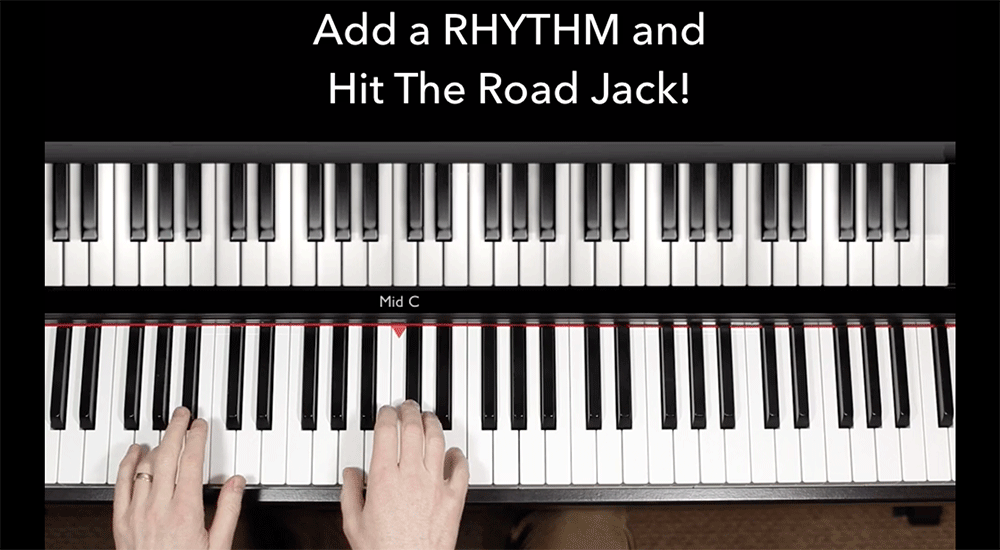
The lessons come in the form of a series of ebooks with embedded video in the .epub format. But there’s also an option to download PDFs.
The full course is composed of 9 ebooks:
- Party Time
- Blues & Rock n Roll
- Chord Magic
- Advanced Chords
- Ballad Style
- All That Jazz & Blues
- Taming The Classics
- Speed Learning
There’s a total of 24.5 hours of video, supporting the ebooks, with animated keyboard graphics illuminating the notes the pianist is playing. There’s also hundreds of written exercises, with accompanying audio clips to give you a sense of what they should be sounding like.
Student Q&A sections answer any frequently asked questions, and there are regular ‘checkpoints’ summarising what you’ve have learned so far.
What I think about Piano For All

I think Piano For All is a great option for a complete beginner who wants to learn piano in an intuitive and fun way.
Although the course is aimed at beginners, I’d say there’s also plenty in here for improvers too. There’s a very clear visual approach, with a focus on learning by ear, which I consider the most natural way to learn. You can always move on to more sheet-music focussed, classical training at a later date if you want to.
It’s a very practical course, and will give you a solid grounding in different rhythmic piano styles. And you’ll be shown how to vamp and improvise, which are such valuable skills in music production.
When you compare the price of this course to a year of learning piano, it looks like an incredible bargain – that’s the power of digital and online courses.
“A staggeringly large library of guitar lessons”
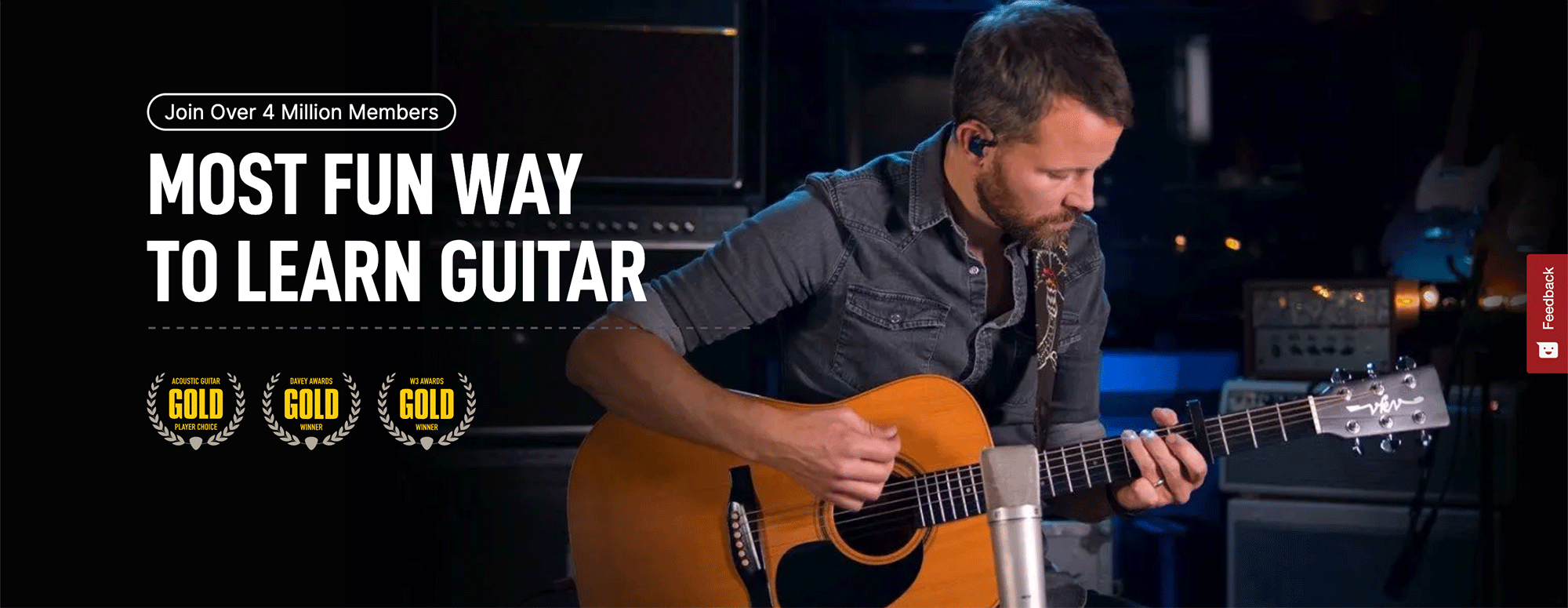
The pros
- Extensive content library
- One of the more established online music courses
- Suitable for beginners through to advanced players
- Tutorials covering a wide range of styles
The cons
- There could be more material for pop fans
- Subscription-style payment
| Length of courses | – As long as you like! – Over 11,000 videos – You’re unlikely to view it all, but there’s plenty to learn from |
| Cost | – $19.99 monthly, or $179.99 yearly – 60 day money back guarantee |
| Free trial | – 14 day free trial – Free basic membership with 24 lessons |
Who are Guitar Tricks?
Guitar Tricks is one of the longest running online music courses, established in 1998, the earliest days of the internet. This course has had years of development and tweaking to create a highly efficient learning environment for students. It also has an extensive content library, built up over time.
Guitar Tricks features video lessons, led by instructors, which offer step by step guides on how to play. There’s basic lessons for beginners, and another section for experienced players. Once you’ve mastered these, you can dive into the hundreds of song tutorial videos. There is also a whole section of lessons dedicated to different genres and styles of playing.
How does Guitar Tricks work?
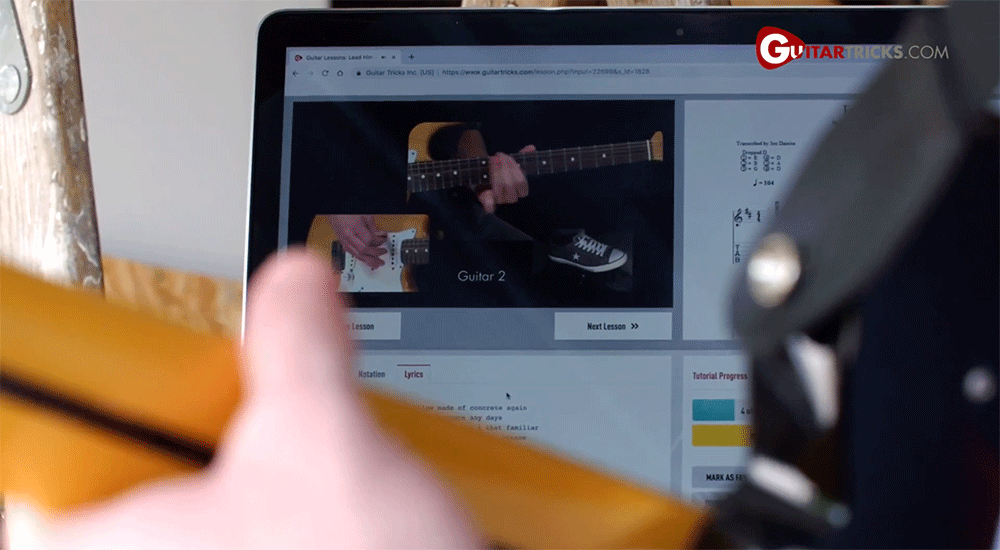
Guitar tricks is available as an app for android or apple, and can also be accessed through a web browser.
When you log in, you’re presented with four options: beginner, experienced, songs, and styles. The ‘beginner’ and ‘experienced’ sections make up the core learning portion of the site.
The beginner section covers all the basics, such as holding the guitar and playing open chords and power chords. From there you can move onto the basic techniques of acoustic, blues, rock or country. The experienced section moves into more advanced territory with techniques like bends and hammer-ons, scales, and advice on amp settings and tone controls.
There are also two other main sections: ‘learn to play songs’ and ‘learn styles of guitar’. The songs section has an impressive library of over 900 songs in a good variety of styles. Each song is accompanied by a series of mini-lessons, which help you perfect your playing. And the styles section covers acoustic, rock, blues, bluegrass, classical, country, jazz, funk, soul, rockabilly, and surf guitar.
Each page has an embedded video lesson next to an accompanying interactive chart or tab. Below this you’ll see the structure of the course, and be able to track your progress as you learn. And if you get stuck, Guitar Tricks offer support from real guitar instructors via zoom.
What I think of Guitar Tricks
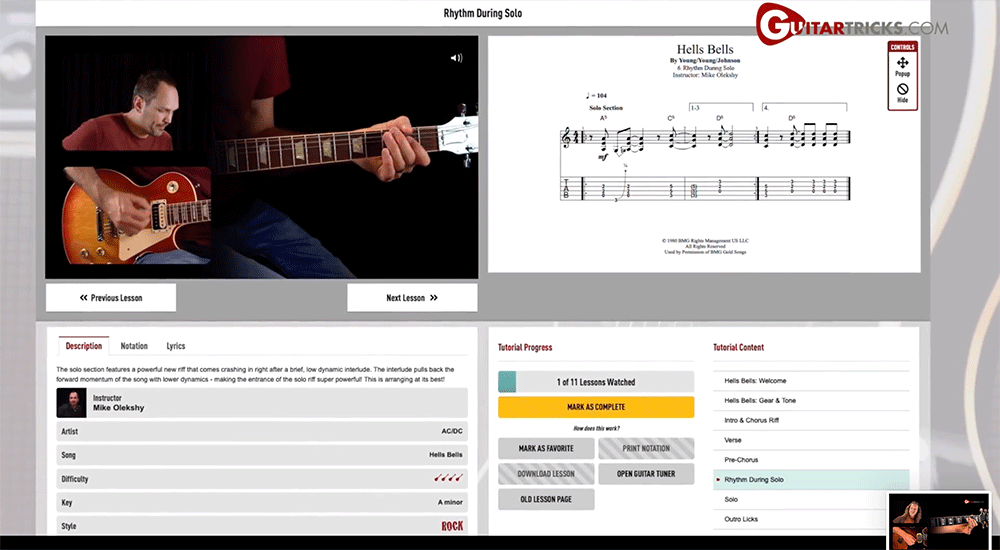
I was very impressed with Guitar Tricks – there’s such a huge amount of material, which has been built up over the years.
The lessons are laid out in a helpful and intuitive way, so you can take in a lot of information without too much effort. There’s probably more styles and genres than many other guitar courses, though it could perhaps benefit from including more material for younger pop fans.
Being able to track your progress track your progress and learn at your own pace is a plus, and the inclusion of real-life support is also a great addition.
Conclusion
I hope this guide to online music production courses has been helpful. Whatever course you choose, please make sure to schedule time in to actually do your assignments! And then put what you’ve learnt into practice as soon as you can, to reinforce your memory.
Remember, all the great musicians, composers and successful music producers throughout history, from Beethoven to Quincy Jones, put in a great deal of time to master the tools they worked with. Creativity and success often look like magic or luck from the outside, but in reality in 99% of cases, it’s down to learning, determination and hard work.
Make learning a habit, and watch your skills, creativity and music productions flourish as you take your music career to new heights!
What next? If you need help in setting up your home recording studio, you’ll find all you need to know here.
